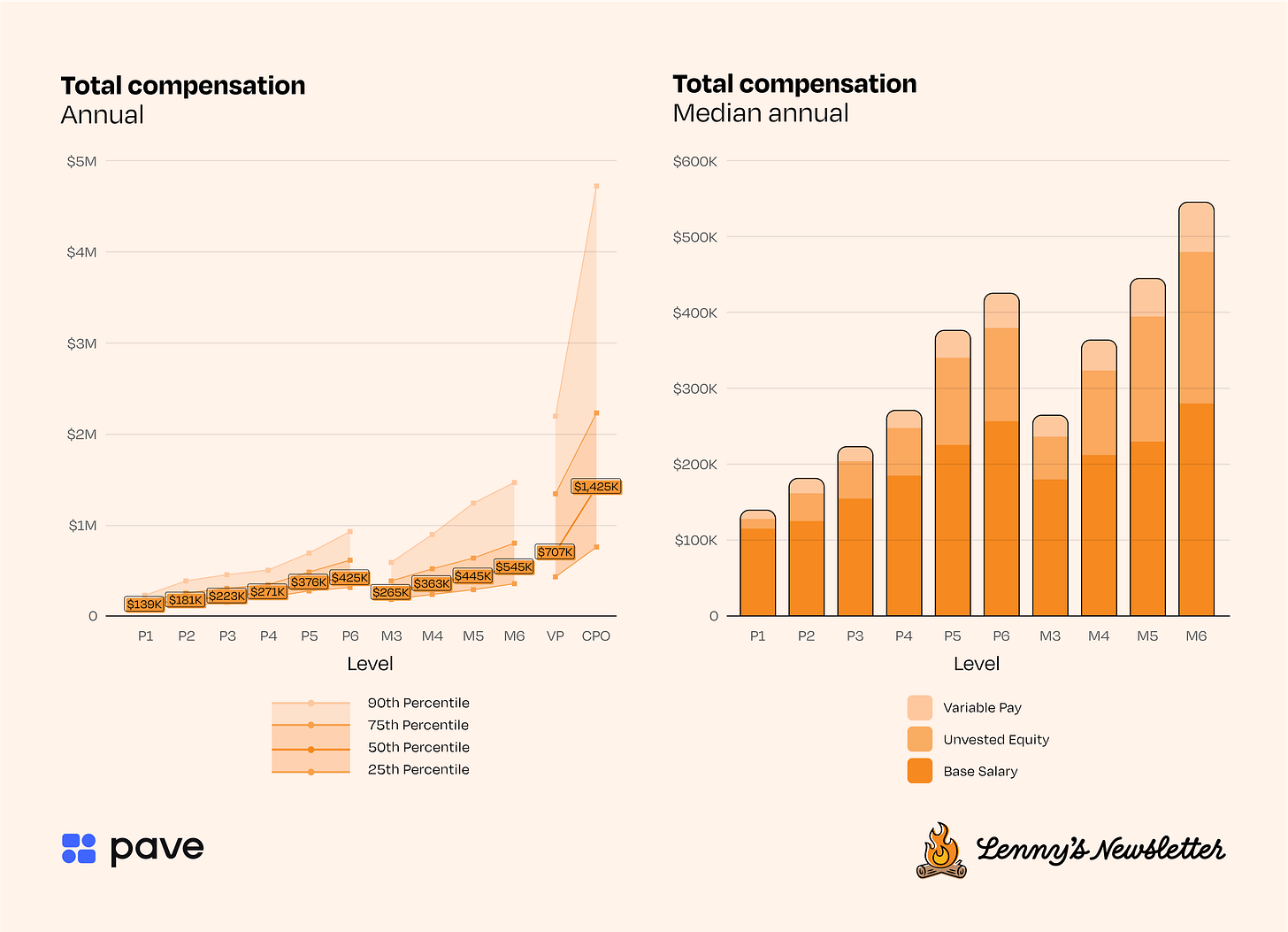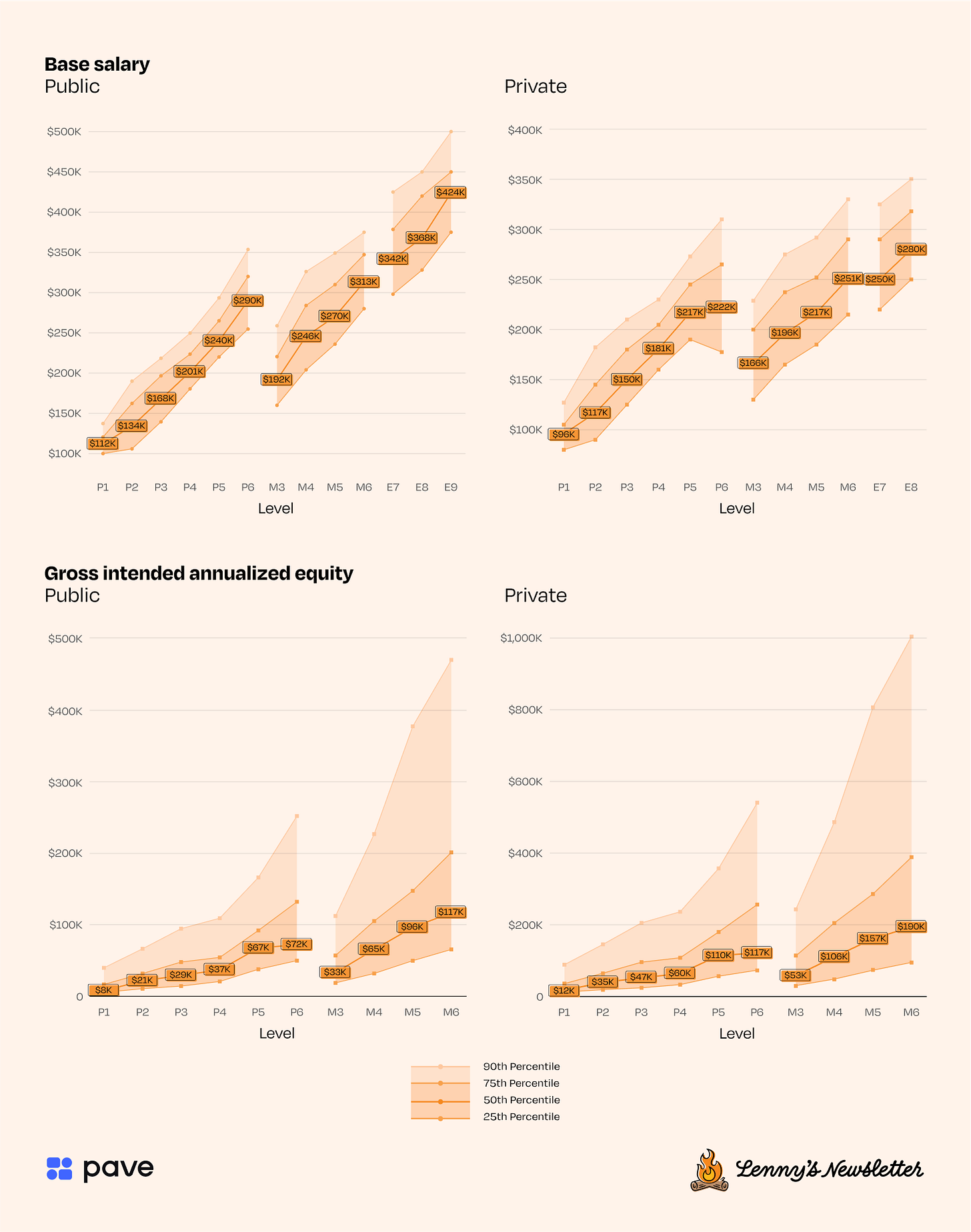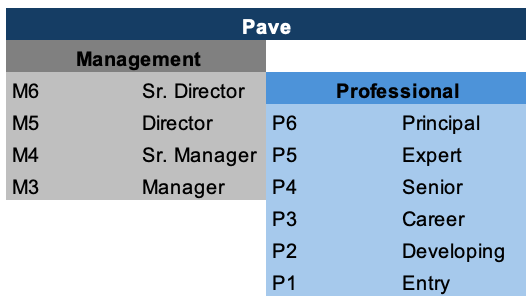How much product managers make in the U.S., Europe, and Canada
Comprehensive salary, equity, and total comp benchmarks for product managers
👋 Welcome to a 🔒 subscriber-only edition 🔒 of my weekly newsletter. Each week I tackle reader questions about building product, driving growth, and accelerating your career. For more: Lennybot | Podcast | Courses | Hiring | Swag
Annual subscribers get a free year of Perplexity Pro, Notion, Superhuman, Linear, and Granola, along with access to the entire 5-year back catalog and a thriving members-only Slack community. Subscribe now.
I love sharing data you won’t find elsewhere, so I’m excited to publish exclusive, in-depth salary benchmarks for product managers in the U.S., Europe, and Canada.
This data is courtesy of Pave, which gets its data by integrating with human resources information system (HRIS) software and equity management systems at over 7,500 top companies to build real-time compensation benchmarks. The data below is based on actual comp from over 23,000 product managers globally, plus a few select data points from Levels.fyi.
Below, you’ll find:
Base salary, equity, and total comp for product managers in the U.S.
How U.S. comp compares to Europe, Canada, and Tier 2 and Tier 3 U.S. cities
A deeper look at Europe and U.K. compensation
Key takeaways
The median starting base salary for a PM in the U.S. is $112,000 at a public company and $96,000 at a private company.
A 90th-percentile senior individual-contributor (IC) PM can hit $350,000 in base salary and close to $1,000,000 in total comp.
New PM managers make less than senior ICs—$265,000 vs. $425,000 in total comp, respectively.
Moving from a Tier 3 U.S. city to a Tier 1 city can increase your salary by 20%.
The median chief product officer makes $1,425,000 in total comp, and the 90th percentile makes nearly $5,000,000.
The biggest salary jump happens going from L4 to L5 and M3 to M4.
PM base salaries are 15% to 20% lower at private companies vs. public companies. They are over 25% lower for product execs (E7-E9).
U.K. PMs make 65% of what the average U.S. PM makes, and the average European PM makes less than 50% of the average U.S. PM.
If you want to maximize your base salary (i.e. stability), join a public company in a Tier 1 U.S. city.
If you want to maximize your upside, get into a senior IC or manager role at a private company in the U.S.
First, an explanation of the levels you’ll see in the charts below
Here’s how the 12 levels you’ll find below map to seniority:
P1 → Entry
P2-P3 → Mid
P4-P6→ Senior
M3-M4 → Manager
M5-M6 → Director
E8 → VP
E9 → CPO
And here’s how these levels map to titles at a typical company, including where IC and manager tracks overlap:
For more, check out this detailed explanation of levels and how they may map to your organization.
Product management compensation in the U.S.
Here are the 25th, 50th, 75th, and 90th percentiles for total comp for product managers in the U.S.:

Top takeaways
The median starting total comp for a PM in the U.S. is $139,000.
90th-percentile IC PMs make close to $1,000,000 in total comp.
New managers make less than senior ICs. The median new manager makes $265,000 in total comp per year—equivalent to an L4 IC PM. You have to hit M5 to make more than the most senior median IC PM.
The median chief product officer makes $1,425,000 in total comp, and the 90th percentile makes nearly $5,000,000.
The median VP of product makes $707,000 in total comp, and the 90th percentile makes over $2,000,000.
The biggest salary jump happens going from L4 to L5 and M3 to M4. And then from VP to CPO.
At Meta (the highest comp of the Magnificent 7), the average M6 makes over $2,000,000 in total comp, and an entry-level (non-associate product manager, or APM) PM makes $232,000 in total comp.
A deeper look at salary and equity
Here’s the same data as above but splitting base salary and equity and comparing public and private company comp:

Top takeaways
The median starting base salary for a PM in the U.S. is $112,000 at a public company and $96,000 at a private company.
A 90th-percentile IC PM at a public company can hit $350,000 in base salary.
PM base salaries are 15% to 20% lower at private companies vs. public companies. They are over 25% lower for product execs (E7-E9).
Unsurprisingly, lower base salaries at private companies are made up for by more equity, especially when things go well. 90th-percentile IC PMs at private companies earn nearly $600,000 in equity/year (vs. $250,000 at public companies), and 90th-percentile PM managers (M6) earn around $1,000,000/year in equity (vs. less than $500,000 at public companies).
The amount of equity 90th-percentile PMs can earn grows very quickly as they rise in the ranks. For example, at a private company, a 90th-percentile M3 earns just over $200,000 in equity, an M4 earns $500,000, an M5 earns $800,000, and an M6 earns $1,000,000.
At Tesla, Microsoft, Nvidia, Apple, Meta, Google, and Netflix (the Magnificent 7), the starting base salary for a (non-APM) PM is $136,000, $156,000, $158,000, $158,000, $167,000, $199,000, and $343,000, respectively. Netflix and Tesla are low on equity, while Meta, Google, and Nvidia are quite high.
Comparing Tiers 1, 2, and 3 U.S cities to U.K., Canada, and Europe broadly
Now let’s look at how other parts of the world compare to the U.S.’s average PM compensation.





